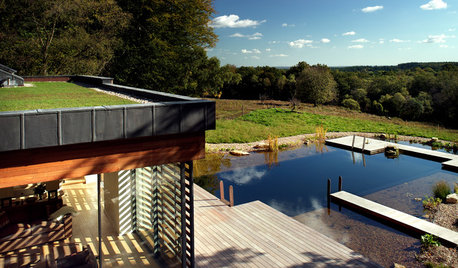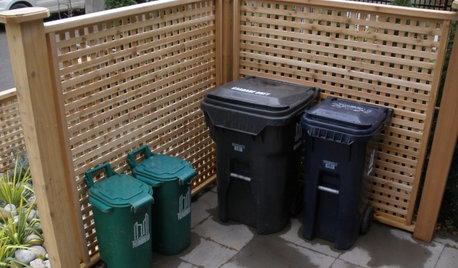How can I find a really good water filter
HU-874585772
4 years ago
Featured Answer
Sort by:Oldest
Comments (22)
User
4 years agoBeverlyFLADeziner
4 years agoRelated Discussions
How far from the waters edge can filter be?
Comments (6)Don't know but I think you can have your filter as far from pond as you want depending on filter and pump. I have 2 systems and 2 pumps. First: Skimmer with tsurnami summersible pump to a waterfall approx. 30 ft away. Second : Bottom drain to sc to two 55 gal.drums filters gravity fed then sequence external pump pumping to 100 gal skippy 40 ft. away. Dont see why it wouldn't work but would be easier if hsd some pictures....See Morerecommendation for a good water filter
Comments (12)It's amusing to read about el cheapo RO experiences where they last 2, 3, or 4 years then have a problem and get replaced. The owners proudly proclaim "This is my 3rd or 4th RO system" and are proud that they spent $140 four times over a four or six year period. Or the horror stories when the homeowner gets home and finds their el cheapo, no name, pacific rim RO split a filter canister or an imitation John Guest or JACO fitting popped and flooded the room. How'd that $140 RO look to the homeowner now? I bought a quality RO in 1995 (for more than $140) assembled from top quality NAME BRAND components (made in the USA) and it's still operating PERFECTLY. It ONLY has two pre-filters, although people who know little to nothing about ROs think three pre-filters are superior, and they have been changed religiously every year while the final (polishing) filter has been changed every two years. I'm on my third membrane and I'm still getting a 96% rejection rate with water that has about 600 TDS. People should exercise some common sense when shopping for appliances that can cause tens of thousands of dollars of damage when they fail... especially inexpensive appliances. The bitterness of poor quality lingers long after the sweetness of low price is gone...See Moreis there a really good post on air layering that I can't find?
Comments (17)FWIW - when ringing the bark below the point at which you want roots to form, there is no real advantage when you include the the zip ties. You'll get the same accumulation of photosynthate and auxin in tissues immediately above the upper ring cut whether or not you use a tourniquet. Rina - ToC mentioned an important point. Auxin stimulates root growth, but its flow is polar, meaning it flows downward in phloem tissues. That means there will be a higher concentration of auxin on the underside of a horizontal or diagonal branch. If you layer that branch while it's in a horizontal or diagonal position, you're likely to get roots ONLY from the bottom of the branch. To 'fix' this (especially important if you're layering a bonsai subject) you should prop the pot up with shims a few days before you prepare the layer so the branch you intend to layer is vertical. After you have constructed the layer, keep the branch you're layering vertical to avoid accumulation of auxin at the lowest point on the cutting and a 1-sided root system. You can return the pot to its normal orientation while watering, but as soon as you're done watering you should return it to the orientation you calculated would ensure it's vertical until you separate it from the main tree. The same is true if you're starting cuttings. E.g., if you want your new tree from a cutting to exit soil in the pot at an angle, cut the proximal end of the cutting at an angle so it's as close to perfectly horizontal as possible when it's stuck. Al...See MoreInexpensive water filter cartridge for an Everpure filter fitting?
Comments (5)Hi Nick, So that is the thing about water filters... they aren't something you want to set and forget. I've talked to people on here who are obsessed with water softener / carbon filter / iron filter / RO... and they forget that there aren't elves that come with each system. With virtually every system, not maintaining it is worse than not having it. The contaminants build up and then can be released in greater concentrations than what's going into the system. In general, carbon cartridge filters should be replaced after no more than a year. That's a general rule and there are exceptions. The reason is that they remove the residual disinfectant in the water and bacteria can build up in them. So I did a quick google search on Everpure H-100 and immediately came up with filters for $40 each. Honestly though, I'd look at paying someone to do something different there. You could do 1 filter to service both and a cheaper filter system (10" big blue). The big blue filter housing allows you to put in standard filters (or no filter at all). A carbon block filter that could service both (and probably then some) would cost you $30 a year. Just an FYI for others reading this: there's also a 20" big blue housing along with multiple stage housings. There are standard size filters that fit these larger housings. I have no connection to the website. I have just been a satisfied customer....See MoreJake The Wonderdog
4 years agolast modified: 4 years agoHU-874585772
4 years agoJake The Wonderdog
4 years agolast modified: 4 years agodecoenthusiaste
4 years agoHU-874585772
4 years agoHU-874585772
4 years agoPatricia Colwell Consulting
4 years agolast modified: 4 years agoHU-874585772 thanked Patricia Colwell ConsultingL thomas
4 years agoJake The Wonderdog
4 years agolast modified: 4 years agoHU-874585772
4 years agoL thomas
4 years agoJake The Wonderdog
4 years agolast modified: 4 years agoL thomas
4 years agoUser
4 years agolast modified: 4 years agoJake The Wonderdog
4 years agomike_kaiser_gw
4 years agovioletsnapdragon
4 years agoUser
4 years agoL thomas
4 years ago
Related Stories

FEEL-GOOD HOMEFeel-Good Home: Water, Water, Everywhere
You can mindfully introduce water features into your landscape no matter the size of your yard
Full Story
THE POLITE HOUSEThe Polite House: What Can I Do About My Neighbors’ Trash Cans?
If you’re tired of staring at unsightly garbage way before pickup day, it’s time to have some tough conversations
Full Story
THE POLITE HOUSEThe Polite House: Can I Put a Remodel Project on Our Wedding Registry?
Find out how to ask guests for less traditional wedding gifts
Full Story
LATEST NEWS FOR PROFESSIONALSDesigning a Business: How Many Clients Can I Handle?
Design business coach Chelsea Coryell weighs in on how to find the right number of clients and projects
Full Story
LANDSCAPE DESIGNGood Fences, Good Neighbors — and Good Views
See-through vertical fencing connects a yard with its surroundings while keeping children and pets safely inside
Full Story
PRODUCT PICKSGuest Picks: Beautiful Things You Can Feel Good About Buying
Upcycled, ecofriendly or just made responsibly, these home accessories and furniture pieces will keep your conscience clear
Full Story
THE ART OF ARCHITECTUREDesign Practice: Why Saying No Can Be Good for Business
When talking with potential clients, ask yourself these questions to determine whether you should accept — or pass on — the job
Full Story
HEALTHY HOMEHow to Choose a Home Water Filtering System
Learn which water purification method is best for your house, from pitchers to whole-house setups
Full Story
PRODUCT PICKSGuest Picks: 20 Stylish, Modern Watering Cans
Help indoor or outdoor plants sip in style with one of these fun watering cans
Full Story





deborahhines